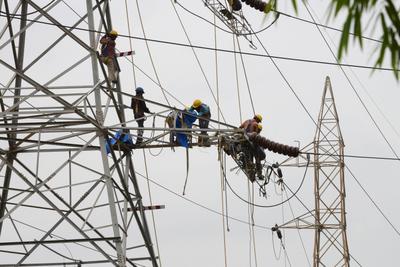India has indicated it is willing to export 500 megawatts of electricity to Pakistan and Bangladesh to help alleviate their energy crises. But there has been considerable opposition to the power-selling scheme, particularly in Pakistan. Jamaat-ud Dawah leader Hafiz Saeed and other hardliners in Pakistan have attacked Prime Minister Nawaz Sharif for agreeing to the scheme, stating that are there is ‘no need to beg India’. Sceptics in India also feel that this is not a pragmatic decision, arguing that the country should first address its own energy crisis before exporting electricity to its neighbours.
It remains to be seen how and when the power trade will actually kick off, since negotiations for the scheme have gone on for far too long without yielding much success. What is encouraging, however, is that Punjab and Tripura, which share borders with Pakistan and Bangladesh respectively, have indicated their enthusiasm for the power-selling scheme — more so than the central government.
Deputy Chief Minister of Punjab Sukhbir Singh Badal discussed the idea of Punjab selling power to Pakistan during his visit there in November 2012. In June, an Indian delegation headed by Indian Joint Secretary Rita Acharya put forward the proposal of selling 500 megawatts of power to Pakistan. Pakistan, which is facing a serious energy crisis, was quick to accept the proposal.
Tripura Chief Minister Manik Sarkar has also urged the central government to push forward the proposal to sell electricity to Bangladesh. India is currently supplying power to the northeastern region of Bangladesh, which borders Tripura, from its power plant in West Bengal. But this alone cannot meet the energy demands in the region. Interestingly, both Manik Sarkar and Bangladesh have agreed to the power-selling scheme. India will sell electricity generated from the ONGC Tripura Power Company (OTPC) at Palatana on the condition that Bangladesh transport heavy power gears through its territory to Tripura.
The recent ‘power diplomacy’ by Punjab and Tripura raises a significant policy question: is it time for the central government in India to delegate certain responsibilities to the states? Poor diplomatic relations between the Indian government and its neighbours, as well as the lack of coordination between the central and state governments in India, is partly responsible for India’s failure to develop stronger economic ties with its neighbours. Giving Indian states the power to determine their own economic affairs could certainly improve economic developments in the region.
While foreign policy obviously plays a central role in the issue, it is time India infuses foreign policy with pragmatic solutions. India should take a leaf out of the Chinese model of economic diplomacy, where states — especially border states — are given substantial leeway when it comes to trade and commerce. Results of the past few years clearly show that these states are more likely to benefit from closer economic relationships with neighbouring countries when they are given more flexibility and latitude.
Instead of allowing the Ministry of External Affairs to drive economic ties with the neighbourhood, greater autonomy must be given to not just the ministries in charge, but the concerned department in the state itself. Rather than getting embroiled in semantics as foreign ministries often do, the concerned department is in a better position to deal with the critical issues. The bilateral economic engagement between India and Pakistan that commenced in April 2011 was a strong reiteration of this point. Commerce Secretaries from both sides avoided entangling themselves in complex issues and focussed on doables, such as the setting up of the Integrated Check Post at the Wagah-Attari border, giving a boost to bilateral trade via this route.
Small steps could be taken to give India’s state governments more autonomy. For example, the central government could give branch secretariats in each state the same responsibilities as the Provincial Foreign Affairs Offices in China. Rather than involving India’s Ministry of External Affairs in every communication between states and India’s neighbours, these branch secretariats have the responsibility of handling basic logistical issues and preliminary negotiation. This way, branch secretariats can act as intermediaries between state and central governments.
State governments of border states should be given greater autonomy when it comes to economic investment and infrastructure projects. The central government could even set up a specific wing in India’s Ministry of Commerce and Industry that works closely with state governments — especially border states — so that trade and infrastructure cooperation with neighbouring countries is not hampered by excessive bureaucracy.
‘Power diplomacy’ is no longer enough for Indian states to manage their own affairs. It is time for India’s border states to be given more power and autonomy to improve economic ties with its neighbours.
Tridivesh Singh Maini is associated with the Jindal School of International Affairs, Sonepat, India

